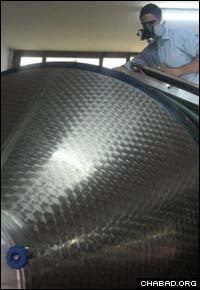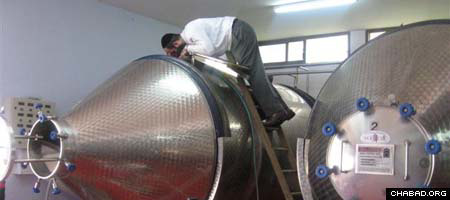
At a time when the tiny island nation's chicken shortage has left its Jewish community bringing in kosher fowl from Italy, and looking to Israel and Europe to supply other Passover staples such as matzah, Rabbi Zeev Raskin, co-director of Chabad-Lubavitch of Cyprus, turned to a local boutique winery to produce a kosher wine.
"Close to 90 percent of the kosher food here comes via plane or sea," says Raskin. "Having wine produced in Cyprus will make it easier for the community to purchase not only the wine, but other Passover products as well."
Raskin partnered with the Lambouri Winery in Kato Platres, a more than 300-year-old operation steeped in tradition, to create a fruity, but dry red wine made from a blend of native Mavro grapes, Cabernet Sauvignon and Grenache Noir. With the assistance of Rabbi Pinchas Leibush Padwa, director of kosher supervision for the European Council of Jewish Communities, Raskin supervised every step of the production.
But the rabbi had more than just utilitarian goals in mind; he wanted the final product to be as good as, or better than, other locally-produced wines in the same price-tier. He found a good fit in Lambouri, which uses locally harvested grapes grown on the southern slopes of the Troodos Mountains. The microclimate boasts rich limestone soil, spring showers and hot, sun-drenched summers; mild winters and a gentle breeze help keep the ravaging effects of frost in check.
Raskin says that he's wanted to make kosher wine in Cyprus ever since learning about the island's viticulture in the Talmud. In a discussion there about the incense brought in the Holy Temple, yayin kafrisin is mentioned as a necessary commodity; incense producers would soak the Onycha spice in the Cypriot wine to make it more pungent.
In deference to the Talmudic account, Raskin, who foresees an even greater demand for kosher food in Cyprus, named the new wine Yayin Kafrisin.








Start a Discussion